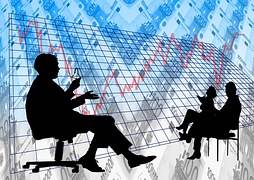 The markets have been abuzz with recession talks and concerns since the 10-year and 2-year Treasury note yields briefly inverted on Wednesday. The inverted yield curve has long been thought by analysts to be a harbinger for a recession, and the markets picked up on that immediately, with global stock indexes and even bitcoin falling on the inversion news. However, the market on Thursday painted a markedly different picture, once which calls into question whether a recession is actually in the making.
The markets have been abuzz with recession talks and concerns since the 10-year and 2-year Treasury note yields briefly inverted on Wednesday. The inverted yield curve has long been thought by analysts to be a harbinger for a recession, and the markets picked up on that immediately, with global stock indexes and even bitcoin falling on the inversion news. However, the market on Thursday painted a markedly different picture, once which calls into question whether a recession is actually in the making.
Data released by the Commerce Department on Thursday showed strong U.S. retail sales in July, a sign that the U.S. economy may not be as weak as naysayers believe. Retail sales increased by 0.7 percent in July, beating Reuters analysts’ expectations for a 0.3 percent increase. Retail sales in July increased 3.4 percent as compared with July 2018.
Bernard Baumohl, global economist for The Economic Outlook Group, was quoted by MarketWatch as saying that he believes consumer behavior will be a stronger indicator as to whether or not a recession is coming than the yield curve is. Baumohl argues that the current economic situation and inverted yield curve is different than past cases because sovereign debt purchases by central banks since 2008 have skewed U.S. treasury yields down. Nevertheless, Baumohl is worried that the U.S.-Sino trade war could trigger a recession. He puts the likelihood of a U.S. recession in the next two years at 30 percent, while many analysts have put a 40 percent chance on their recession predictions.
The positive data wasn’t enough to reverse the widespread opinion that the Federal Reserve will implement another rate hike in September. It also wasn’t enough to undo the steep market losses seen on Wall Street on Wednesday. The S&P 500 eked out a 0.25 percent gain for the day, while the Dow Jones Industrial Average closed up 0.39 percent. The NASDAQ continued its downtrend, ending the day down 0.09 percent. Asian markets took their cues from Wall Street and traded mixed on Friday morning. Hong Kong’s Hang Seng Index was up 0.63 percent as of 11:33 a.m. HK/SIN after President Carrie Lam announced a new stimulus package on Wednesday. Japan’s Nikkei 225 was up 0.09 percent. In the red were South Korea’s Kospi, down 0.88 percent, and Australia’s ASX 200 which was 0.08 percent lower.
